The Checker Maven
The World's Most Widely Read Checkers and Draughts Publication
Bob Newell, Editor-in-Chief
Published every Saturday morning in Honolulu, Hawai`i
Noticing missing images? An explanation is here.
Bumped Off

It's time for another installment from Willie Ryan's classic Tricks Traps & Shots of the Checkerboard. This month we'll see a practical example of the "run-off" tactic, and one of the earliest "gotchas" ever published. But we're sure you'd rather hear from Willie directly.
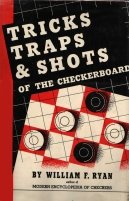
Bumped Off on the Run-Off
As a general rule, it is sound strategy to attack an advanced piece by squeezing or running it off. In the following example we have a good illustration of what can happen when a player tries to maintain an advanced piece against tactical pressure.
11-16 24-20 16-19 23-16 12-19 22-18 8-11 27-23 4-8 23-16 8-12 32-27 12-19 27-23 3-8---A.
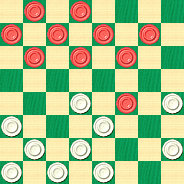
WHITE
White to Play and Win
W:W18,20,21,23,25,26,28,29,30,31:B1,2,5,6,7,8,9,10,11,19.
A---Black gets a rude awakening after this plausible push. The right route to draw is: 11-16, 20-11, 7-16, 18-15, 9-14, 15-11 (25-22, 6-9 draws), 6-9, 25-22, 9-13, 22-18, 10-15, 18-9, 5-14, 29-25, 15-18, 26-22, 18-27, 31-15, 2-6, etc.
The Scrub's Delight
11-15 23-19 8-11 22-17 4-8---A 17-13 15-18 24-20 11-15 28-24 8-11 26-23 9-14 31-26 6-9 13-6 2-9 26-22 9-13---B.
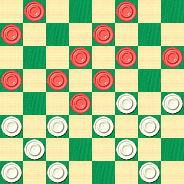
WHITE
White to Play and Win
W:W19,20,21,22,23,24,25,27,29,30,32:B1,3,5,7,10,11,12,13,14,15,18.
The illustrated layout was one of the earliest standard pitfalls to be recorded in checker literature, being first shown, in 1800, by that pioneer chronicler of the checker art, Joshua Sturges. Appropriately labeled "The Scrub's Delight," it has probably dropped more novices than any other trap on the board.
A---Completes the Old Fourteenth opening, one of the first and most popular developments tackled by the learner. Winning chances are about equal.
B---Time-tested standard play to here. The text loses, forming the Scrub's Delight. The correct play to force a draw is: 1-6, 22-17, 18-22, 25-18, 15-22, 23-18, 14-23, 27-18, 9-13, 17-14, 10-17, 21-14, 6-10, 30-25, 10-17, 25-21, 22-26, 21-14, 26-31, 19-15, 31-26, 15-8, 26-22, 32-28, 22-15, 24-19, etc.
Don't get bumped off and don't be a scrub. Try out the problems and then click on Read More to check your solutions.![]()
Faster Than A June Bug

Actually, we're really not sure how fast a June bug might be, but you'll need to be at least as fast to solve the June speed problem. Although not conceptually difficult, it does require good visualization. Click below to show the problem and start the clock. You have 60 seconds!
June Speed Problem (Easy to Medium)
Try the problem, and if you're stuck, don't be bugged! Fly your mouse over to Read More to reveal the solution.![]()
Introducing Priscilla K. Snelson (conclusion)

We last left our hero, Marvin J. Mavin, in somewhat dire straits. Recall that in Part One of the story (click here to read it again) Marvin and his girlfriend Priscilla were at a fancy champagne party. Marvin got into an argument with Russian Draughts master Dmitri Tovarischky and a challenge game, with a thousand dollars riding on the outcome, was in progress. We pick up the story with Marvin a man down in the game and not a beer in sight.
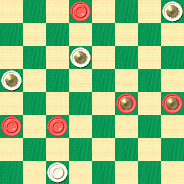
WHITE (Marvin)
White to Play
W:WK4,K10,K13,30:B2,K19,K20,21,22.
Marvin continued to fidget in his chair and mutter under his breath. Then, suddenly, he leaped to his feet, grinning widely, and played:
| ... | 13-17 |
"Why Checkers Boy is laughing?" asked Dmitri, obviously annoyed with Marvin's antics. "You think chasing my man is smart move. Watch, Dmitri is only getting another king!"
The game continued:
| 22-25 | 17-22 |
| 25-29 | 4-8 |
Suddenly Dmitri's expression changed from a satisfied scowl to a concerned and puzzled look. "Pieces on 29, 21, and 2 cannot move," he said quietly. "Why is situation so difficult now for great Russian champion?"
Marvin had settled in his chair, no longer moving about. A sly smile was all that could be seen on his face. The watching crowd, too, was silent. They were no longer even sipping their champagne. Play went on:
| 19-16 | 10-14 |
| 2-6 | ... |
Dmitri let out a long breath. "Ha, Checkers Boy! You see! Man is moving now and Russian Champion will win game!"
| ... | 14-18 |
But now Dmitri was scowling again. "Da, da, da, man goes to 9 and gets lost when King moves 22 to 17 and then to 13. Checkers Boy is thinking he is clever boy...."
| 20-24 | 18-14 |
| 24-19 | 22-17 |
| 19-24 | 17-22 |
| 24-27 | 14-17 |
| 6-10 | 22-18 |
Marvin lifted his head and spoke in a manner that was, at least for him, uncharacteristically quiet. "You ain't going nowhere, are ya, Pinko!"
| 29-25---A | ... |
"OK big Checkers Boy! Now king is moving from corner!" gloated Dimitri.
| ... | 17-13 |
"Nyet, nyet, nyet! Dmitri will not put king back in corner!"
| 27-24 ?---B | ... |
Marvin sat up straight and exclaimed, "Losing patience, are ya now! Well take this!"
| ... | 18-14! |
| 10x17 | 13x29 |
Drawn.
A---Accomplishes nothing, but neither does anything else. 27-24 might be a little better.
B---25-29 doesn't allow the quick wrapup, but still only draws, as Black can make no progress.

Marvin jumped up, raised his arms, leaped and clicked his heels in mid-air. "Did you see that! Did YOU see that! Yeah, ya fat Russkie, you were gonna beat old Marvin, were ya! Well I showed ya didn't I!"
Marvin's girlfriend Priscilla, who up to this point had kept a bit of a distance from the playing table, was starting to get a very unpleasant tight and white look. "Marvin...you only got a draw and you really ought to be a little nicer..." she began to say, in a voice that was a little too calm. But Marvin could not be stopped, as he turned his attention to the watching crowd.
"And all a youse!" he said, "Hangin' around waitin' for poor ole Marvin to lose so Russkie here can buy ya all some expensive vodka! Yer all a bunch a put-ons! Ya oughta drink beer like real people!"
"MARVIN, YOU CAN FIND YOUR OWN RIDE HOME!" shouted Priscilla in a most unladylike manner. She turned on her heels and strode to the exit, letting the door slam behind her.
"Uh.... honey?" said Marvin, taken with surprise. But it was too late.
The crowd dispersed quickly, the party mood of the evening ended. Dmitri was no longer anywhere to be seen, having silently slipped away at the end of the game. Somewhat sullenly, Marvin packed up his checkers and board, and went out alone into the night, hoping to find a bar still open where he could at least get a beer.![]()

If you are of legal age and choose to drink, The Checker Maven asks that you do so in a responsible manner. Drinking and driving is a serious and dangerous crime; please don't ever do it.
White to Move and Draw, Cowboy

Most stroke problems have as terms that one side or other is to move and win. In this month's problem, though, we're only looking for a draw, so obviously, the problem must be easier than most, wouldn't you say?
Perhaps by now you know us better than that! Today's problem will require your best efforts at visualization in order to earn the draw in the following situation.
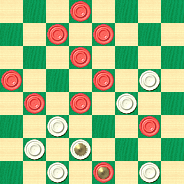
WHITE
White to Play and Draw
W:W16,19,22,25,K26,30,32:B2,6,7,10,13,15,17,18,24,K31.
Just don't be too quick on the draw yourself; give the problem a try before clicking on Read More for the solution.![]()
Just Ask Your Mom

Mother's Day this year is celebrated on Sunday, May 14, 2006, the day after this article is due to be published, and we hope you've remembered your Mom in whatever way might be appropriate.
While we can't really say that today's feature problem is directly related to Mother's Day, it's a real teaser, and if you're stuck, we suggest that you just ask Mom for help.
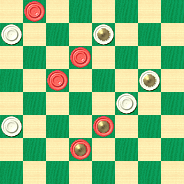
WHITE
White to Play and Win
W:W5,K7,K16,19,21:B1,10,14,K23,K26.
Forces are even, but White has a man stuck in the dog hole. What is to be done?
Solve the problem, and check your solution with Mom. If she plays coy, though, you can always click on Read More for the answer.![]()
The Goose Walk

Today's installment from Willie Ryan's Tricks Traps & Shots of the Checkerboard includes the well known "Goose Walk" trap. No doubt you're familiar with it, so try your luck and see if you can work it out over the board. The lesson is rounded out with a trap in the Ayrshire Lassie opening. Clicking on Read More is no trap, though; it will show you Willie's solutions to these interesting and practical positions.
Here's what Willie has to say.

The Goose Walk
Still another first-round knockout that has tripped many a tyro is the deady Goose Walk, a favorite coup de grace of the experts for over 150 years. It is also known as the "Old Farmer," but by any name it's dynamite to the neophyte. Here's the run-up:
11-15 22-18---A 15-22 25-18 8-11 29-25 4-8 24-20 10-15 25-22 12-16 27-24---B. See the diagram.
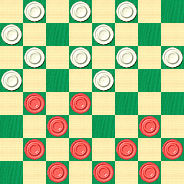
BLACK
Black to Play and Win
B:W32,31,30,28,26,24,23,22,21,20,18:B16,15,11,9,8,7,6,5,3,2,1.
A---This trade-off identifies the single corner opening. More play has been published on it than on any other lead-off. It makes an even game.
B---This and 28-24 lose, allowing the Goose Walk, first shown by William Payne in 1756. The correct moves are: 21-17, 8-12, 17-13, etc.
An Old Lassie Catch
Ever since 1800, champions have been baiting beginners with the snap-trap on the Ayrshire Lassie opening outlined on the next page. Every learner has to become familiar with the basic ideas behind these elementary snares if he hopes to reach the expert class.
11-15 24-20 8-11 28-24 4-8 23-19 15-18 22-15 11-18 26-22 7-11 22-15 11-18 30-26 8-11 26-22---A See the diagram.
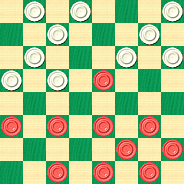
BLACK
Black to Play and Win
B:W32,31,29,27,25,24,22,21,20,19:B18,12,11,10,9,6,5,3,2,1.
A---The bad one. The correct moves are: 25-22, 18-25, 29-22, 11-15, 27-23, 9-13, 32-28, 6-9, 19-16, 12-19, 23-16, 9-14, 24-19, 15-24, 28-19, 2-6, 26-23, 10-15, 19-10, 6-15, 16-11, 1-6, 31-27, 6-9, 11-7, 3-10, 27-24, 15-18, 22-6, 14-17, 21-14, 9-27, ending in a draw.![]()
Speedy Delivery
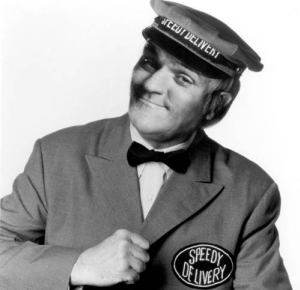
With the traditional Mother's Day celebration just around the corner, you'll need the services of Speedy Delivery to get your flowers there on time! Similarly, you'll need to be pretty speedy to beat our relentless time clock on this month's pair of speed problems.
The first one is quite easy. The second one requires fast thinking and good visualization. We'll give you 15 seconds on the first one and a full minute (!) on the second. Click on the links below to show the problems and start the clock.
Whether or not you can deliver the solutions, clicking on Read More will speedily show you how it's done.
May 2006 Speed Problem 1 (easy)
May 2006 Speed Problem 2 (medium)
And now here's an off-the-wall trivia question: who played the character of Mr. McFeely (the Speedy Delivery man) on the celebrated Mr. Rogers Neighborhood television show? There's a reason why we ask.![]()
A Paisley Problem

We're not returning today to the famed and troubled sixties, those times of tye-dyed shirts, paisley trousers, lava lamps, and much more which we shan't explore here. Instead, we're going back a full hundred years to the days of J. D. Janvier, who named the go-as-you-please opening 11-16 24-19 8-11 "The Paisley," without the slightest foreknowledge of peaceniks, Haight-Ashbury, or bell-bottoms. (We understand that Mr. Janvier was, much more prosaically, instead making reference to a town in Scotland.)
Here's some interesting published play in the Paisley:
| 1. | 11-16 | 24-19 | 2. | 8-11 | 22-18 |
| 3. | 4-8 | 18-14 | 4. | 9x18 | 23x14 |
| 5. | 10x17 | 21x14 | 6. | 16x23 | 27x18 |
| 7. | 12-16 | 28-24 | 8. | 8-12 | 26-23 |
| 9. | 16-20 | 31-27 | 10. | 6-9 | 25-21 |
| 11. | 1-6 | 29-25 | 12. | 11-16 | 24-19 |
| 13. | 6-10 | 30-26 | 14. | 10x17 | 21x14 |
| 15. | 7-10 | 14x7 | 16. | 3x10 | 26-22 |
| 17. | 9-13 | 25-21 | 18. | 2-6 | 18-15 |
| 19. | 10-14 | 22-18 | 20. | 5-9 | 15-11 |
| 21. | 13-17 | 11-7 | 22. | 17-22 | 7-2 |
| 23. | 22-26 |
And so we arrive at the following position.
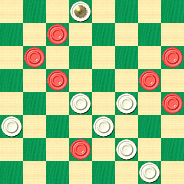
WHITE
White to Play and Win
W:W32,27,23,21,19,18,K2:B26,20,16,14,12,9,6.
Without turning to your books of published play, can you, fully on your own, find the White win? Even better, can you find Black's losing move in the play above, and correct it? To help in following the play, you can click here for an on-line animation.
If the effort frays your bell-bottoms or ruffles your Paisley trousers, clicking on Read More will bring you the answers quicker than you can light your lava lamp.![]()
Just a Little Bit of Difference

Sometimes, just a little bit of difference is all it takes... and that's the subject of today's installment in our continuing series of lessons in Checker School.
Here's the first situation we'd like to have you consider:
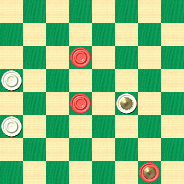
WHITE
White to Play and Win
W:W13,K19,21:B10,18,K32.
Forces are even, but the Black man on 10 is decidedly exposed, and we'd have to give the edge to White.
But now, take a look at this one:
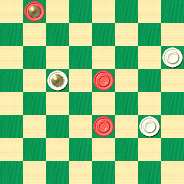
BLACK
Black to Play and Draw
B:W21,K19,9:BK32,18,10.
Not much difference, is there? It's as if White had played 13-9 in the first diagram, not at all an illogical move on the face of it, and thereby changed a win into a draw!
Checkers is indeed a subtle game, where little differences can mean a lot. Make a difference for yourself by solving these two problems, and then clicking on Read More to see the solutions, with detailed notes and a sample game.
[Read More]The Six Move Blitz

Here are two more entries from Willie Ryan's classic Tricks Traps & Shots of the Checkerboard, as we continue our long-term project of republishing the entire book for your entertainment and edification. Let's hear Willie in his own words.

A Hole in The Dyke
The struggling tyro seems to have an unexplainable "aptitude" for walking into the following shot with his eyes wide open. I have scored with it innumerable times. To arrive at the position on the diagram, move:
11-15 22-17 15-19---A 23-16 12-19 24-15 10-19 25-22 8-11 29-25---B 11-15 27-23---C.

BLACK
Black to Play and Win
B:W32,31,30,28,26,25,23,22,21,17:B19,15,9,7,6,5,4,3,2,1.
A---Forms the Dyke, a standard opening.
B---A very weak move, but drawable; 27-23 or 17-13 would be better.
C---Hooked! The following series of moves draws narrowly and corrects important play by F. Teschelheit: 17-13, 4-8, 21-17*, 7-10, 27-23, 8-12, 23-16, 12-19, 31-27* (the only move to draw, correcting Teschelheit, who gives 32-27 to a black win), 2-7 (if 3-8, 17-14 draws; if 9-14, 27-23 draws), 27-23, 19-24, 28-19, 15-24, 23-18, 7-11, 17-14, 10-17, 25-31, 3-7, 21-14, 24-28 (11-16, 14-10, white wins), 22-17, 11-16, 26-22, 16-19, 30-26, 7-11*, 14-10, 6-15, 13-6, 1-10, 18-14, 19-23, etc., drawn. Wm. F. Ryan.
A Six-Move Blitz
Among the most effective six-move killers is this well-known example on the Denny opening. Set up the pieces for play. Now move 10-14, 23-19, 11-16, 26-23, 9-13, 20-24---A, and we get the layout of pieces pictured here.
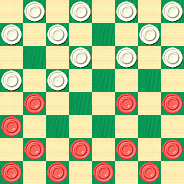
BLACK
Black to Play and Win
B:W32,31,30,29,28,27,25,23,22,21,20,19:B16,14,13,12,8,7,6,5,4,3,2,1.
At A, instead of 24-20, white can get a good game by 22-17, 13-22, 25-9, 5-14, 29-25, 7-11, 25-22 (not 24-20, 14-18), 6-10, 22-18, 1-5, 18-9, 5-14, 30-25, 11-14, 25-22, 16-20, 22-17, 8-11, 17-13, 2-6, 31-26, 12-16, 19-12, 11-16, 13-9, 6-13, 26-22, 16-19, 23-16, 3-7, 22-18, 15-22, 16-11, 7-16, 24-19, 16-23, 27-9, 10-15, 9-6, 22-26, 6-2, 15-19, 32-27, 4-8*, 12-3, 26-31; resulting in a draw.
When you've blitzed these problems, and are sure there are no holes in your solutions, you can click on Read More to see how Willie worked these out.![]()
The Checker Maven is produced at editorial offices in Honolulu, Hawai`i, as a completely non-commercial public service from which no profit is obtained or sought. Original material is Copyright © 2004-2025 Avi Gobbler Publishing. Other material is public domain, as attributed, or licensed under Creative Commons. Information presented on this site is offered as-is, at no cost, and bears no express or implied warranty as to accuracy or usability. You agree that you use such information entirely at your own risk. No liabilities of any kind under any legal theory whatsoever are accepted. The Checker Maven is dedicated to the memory of Mr. Bob Newell, Sr.

